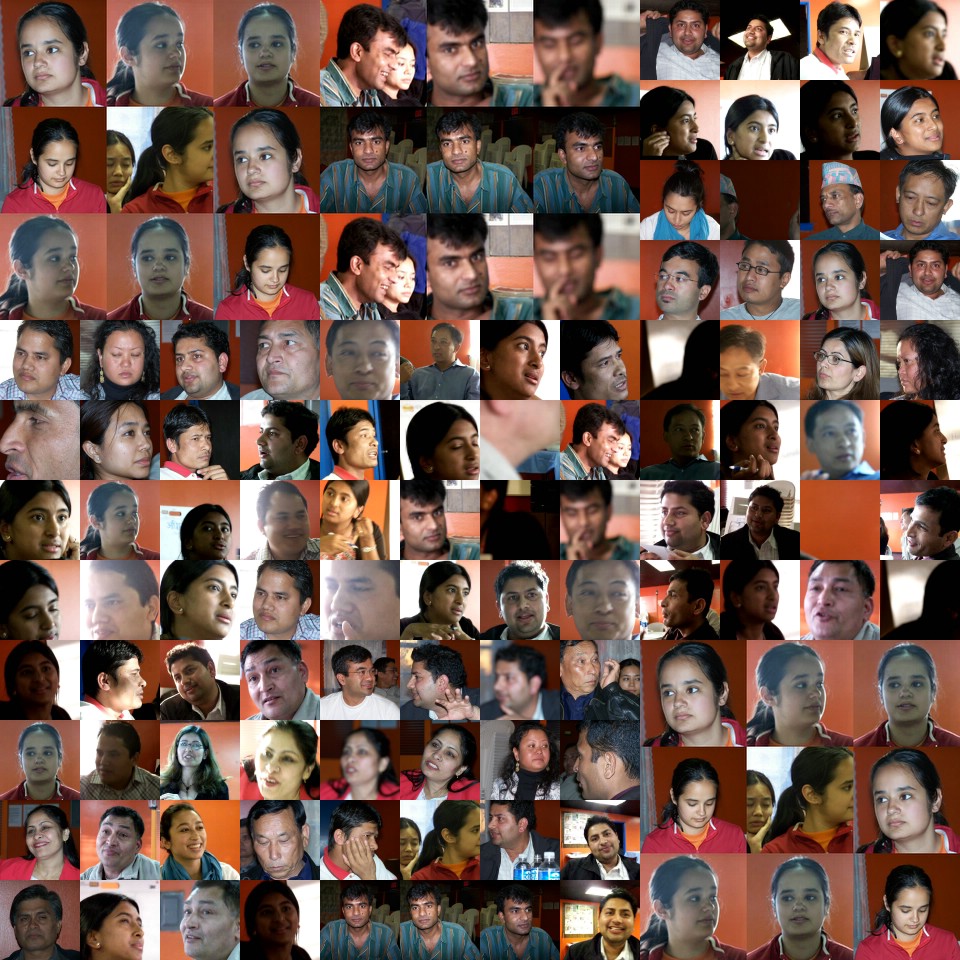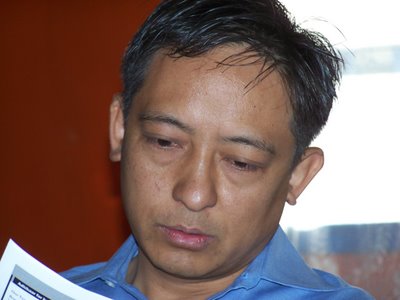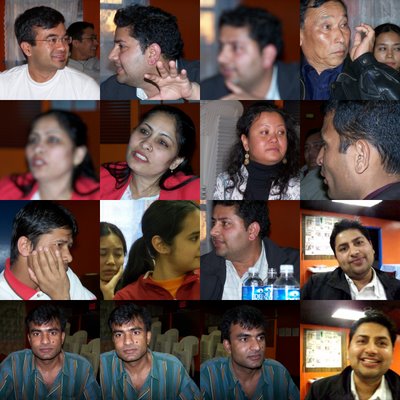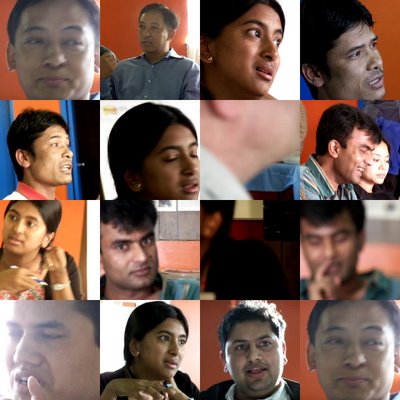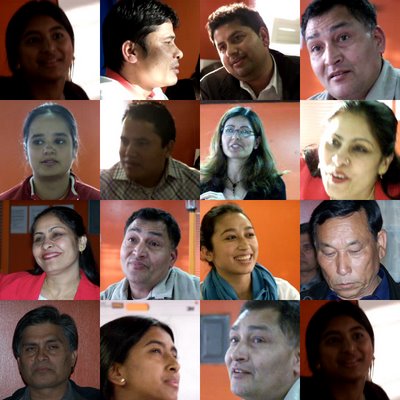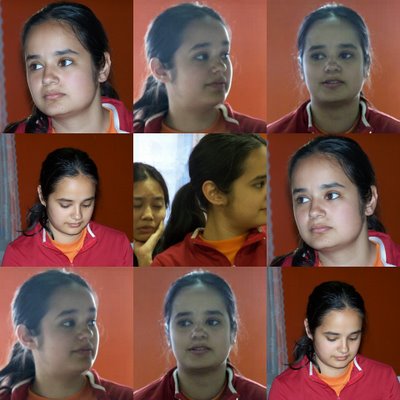
Zimpundit: Zimbabwe
I am a relatively new student of Zimbabwe politics, and I am not going to pretend I know a whole lot. But even a perfunctory glance at the situation has lead me to believe the fundamental flaw of the democracy movement there is that it hopes to win the 2008 presidential race. That is a self-defeating goal.
Mugabe is a dictator, he has been a dictator. His dictatorship has been made possible by a constitution that needs to go. The goal of the democracy movement should be to boycott the 2008 elections. The goal should be to prepare to launch a democracy movement to form an all party government to conduct free and fair elections to a constituent assembly to write a new, democratic constitution. The goal has to be to get people out in large numbers, to shut the country down for a few weeks.
The First Major Revolution Of The 21st Century Happened In Nepal
Democracy Spreading Mechanism
The Demosphere Manifesto
5 Steps To Democracy
Proposed Constitution
The guidelines presented in the links above are all open source. They can be and should be modified to make sense for the local circumstances. It is just that all such debates should take place in the open, online. When they take place offline, they should be documented and archived online.
All of Mugabe's elections have been fundamentally flawed. That is how he has managed to stay in power for so long. You do not participate in a Mugage election, you boycott it. If you participate, you rubber stamp his dictatorship and wrong ways.
I am honored to have been in constant communication with Zimpundit after the April Revolution. He is in America like I am. He is also a Global Voices author, like I am. He has strong feelings for democracy and for his country of origin. We are going to collaborate more closely for the sake of Zimbabwe. This is taking digital democracy activism to a whole new level. All that you can do online, you do online. The online medium is such an efficient medium. Zim, I am in.
Zimbabwe: Constitution
There is a provision for a foreign woman to become a citizen of Zimbabwe if she marries a man who is a citizen of the country. What about foreign men? This is sexist. Only children adopted by men get citizenship. That is wrong. There is all this talk of "legitimate" children. All children are legitimate. I get the impression Zimbabwe is still one of those countries where single mothers are seriously frowned upon. That is sexist and wrong.
There is a declaration of rights, but those rights are subject to their being in the "public interest." As in, if the government deems your exercise of a particular right against the public interest, that right might get curtailed. It is with this escape clause that Mugabe has been hounding his opponents for decades. It is this climate of fear that has sustained him. He does not care to be loved and admired. He just wants to be feared. It sure has worked for him: "rights and freedoms subject to such limitations of that protection as are contained herein, being limitations designed to ensure that the enjoyment of the said rights and freedoms by any person does not prejudice the rights and freedoms of others or the public interest."
The public interest is such a vague, loose phrase. That is practically like the government having veto power over individuals.
The state can legally kill you "for the purpose of suppressing a riot, insurrection or mutiny or of dispersing an unlawful gathering." That is another dose of blanket power in Mugabe's hands.
The state can lawfully kill you to prevent you from possibly committing a crime: "in order to prevent the commission by that person of a criminal offence." That falls in the sci-fi zone, as far as I am concerned.
A person can be deprived of liberty "upon reasonable suspicion of his having committed, or being about to commit, a criminal offence." So you could get arrested if you are about to organize a rally that might turn into a riot? The lines are blurry.
You could also be detained "in execution of the order of a court or with the consent of his parent or guardian, for the purposes of his education or welfare during a period beginning before he attains the age of twenty-one years and ending not later than the date when he attains the age of twenty-three years." That is like saying you are 18, but you are not yet an adult.
Also "for the purpose of preventing the spread of an infectious or contagious disease." This is suspicious.
Also "if he is, or is reasonably suspected to be, of unsound mind, addicted to drugs or alcohol, or a vagrant, for the purpose of his care, treatment or rehabilitation or the protection of the community." The state gets to decide if you are of unsound mind. What if you organize an insurrection? Is that the act of an unsound mind? There is this tone that the state is doing it for your own good. That is so patronizing.
Also "for the purpose of preventing his unlawful entry into Zimbabwe or for the purpose of effecting his expulsion, extradition or other lawful removal from Zimbabwe." I can imagine this might apply to political dissidents.
"Any person who is arrested or detained shall be informed as soon as reasonably practicable, in a language that he understands, of the reasons for his arrest or detention and shall be permitted at his own expense to obtain and instruct without delay a legal representative of his own choice and hold communication with him." It does not say 24 hours. As soon as possible could be really long, especially if you are a targeted individual. And legal representation is not provided by the state. If you can't afford it, you don't have it. This is fundamental abuse.
There is a provision that "No person shall be subjected to torture or to inhuman or degrading punishment or other such treatment." But then the subsequent provision makes that null and void: "No treatment reasonably justifiable in the circumstances of the case to prevent the escape from custody of a person who has been lawfully detained shall be held to be in contravention of subsection (1) on the ground that it is degrading." Every time there is a mention of some kind of a fundamental right, there is always an escape clause that gives the state veto power.
Mugabe seems to have imposed a threat of physical harm upon the population. He has instilled fear. The people of Zimbabwe have not been a free people.
"Where any person, by virtue of a law, contract or scheme relating to the payment of pensions benefits, has a right, whether vested or contingent, to the payment of pensions benefits or any commutation thereof or a refund of contributions, with or without interest, payable in terms of such law, contract or scheme, any law which thereafter provides for the extinction of or a diminution in such a right shall be regarded for the purposes of subsection (1) as a law providing for the acquisition of a right in property." Is this like saying the government can rob you of your pension?
There are other provisions that basically challenge the right to property. You may own property, but the state has final say.
The purpose of a democratic constitution is to protect the individual from the state. The purpose of an autocratic institution is to protect the state from the individual. The Zimbabwe constitution falls in the second category.
The Zimbabwe constitution does not seem to be able to think of one fundamental human right that it does not want to smother beyond recognition. If rights are presented with ifs and buts, they are not rights at all.
I have made these comments after having read just the first one seventh of the document. This has been enough to convince me that the goal of the democracy movement should be to scrap this constitution.
The language of the document is rather convoluted. I am sorry if I misread or misunderstood some parts. I stand corrected. But these are my first impression complaints. This document is too flawed to be amended. It needs to be scraped to make way for something new.
On The Web
Movement for Democratic Change Online
ZIMBABWE: Democracy movement debates sanctions
The Zimbabwe Movement -- Homepage -- Get involved today!!
Zvakwana - Sokwanele - Enough is Enough - Home Page
World Movement for Democracy - Promoting Labor Rights
World Movement for Democracy - Breakthrough Elections
Frontline 7 - Zimbabwe: for democracy and socialism
modified - Report by Social Movement observer delegation to ...
Cuba
Report by Social Movement observer delegation to Zimbabwe
All you need to know about Arthur Mutambara
Mutambara outlines new MDC focus
ZWNEWS.com - linking the world to Zimbabwe
ISS Today: Arthur Mutambara Returns to Head MDC
allzimbabwe.com - Strive Masiyiwa Snubs Pro-Senate MDC and settle ...
MLK Visiting Professors welcomed - MIT News Office
_ Africa Leadership Initiative ::: _ List of Fellows
Zimbabwes Biggest Daily Online Newspaper - read it here first ...
BBC NEWS | World | Africa | Zimbabwe's 'outsider' faction leader
Arthur Mutambara - Wikipedia, the free encyclopedia
